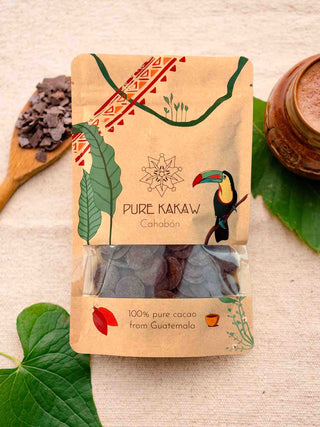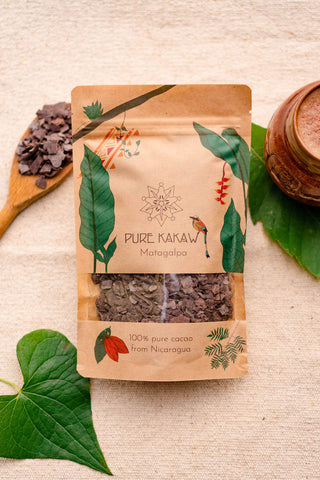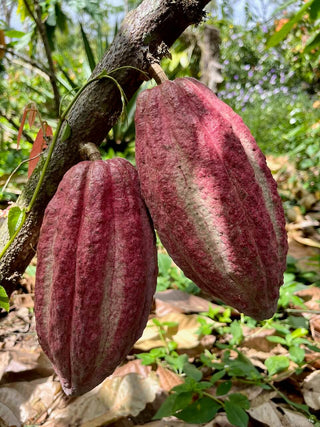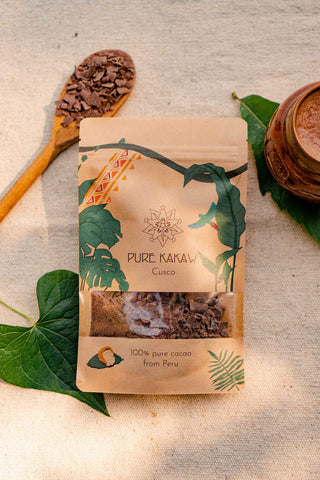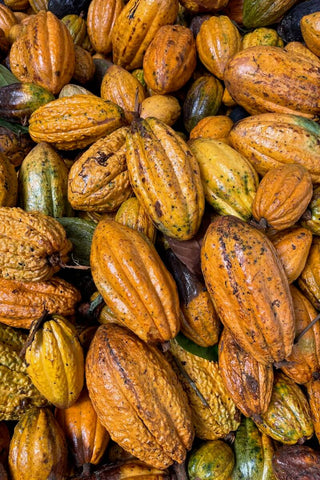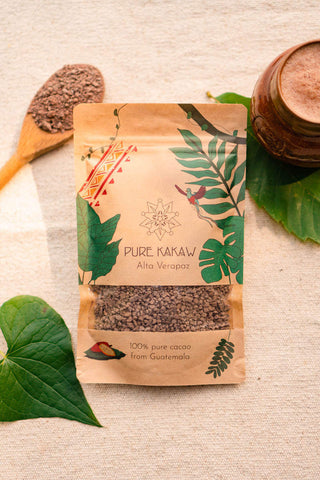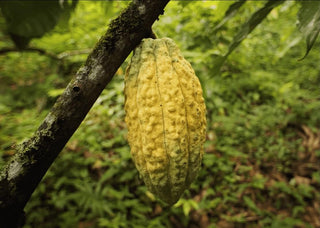Motherhood is a transformative journey, filled with both beauty and challenges. As your body changes, cacao can be a nurturing companion, offering a moment of presence and reflection. Many women find cacao a helpful alternative to coffee or enjoy it as part of a daily ritual. During pregnancy, cacao can be a way to connect with your body’s wisdom and support your emotional and physical well-being. But also don’t forget the fathers or other partners with whom it’s beautiful to share cacao in these times. Since this is one of the most vulnerable stages in life we understand all concerns and questions of how to enjoy cacao responsibly and hope to shed more light on that here.
In short: cacao provides various benefits like cardiovascular health, blood pressure regulation, stress reduction, positive mood for both mother and child, healthy nutrition (minerals, flavanols), preeclampsia prevention and even can support breastfeeding. Possible negative side effects can occur with high daily cacao intake, but also need to be seen in a broader perspective of being mindful of all the things you consume during this time. Preferably choose cacao with low cadmium and lead contents. Scroll down for more detailed studies about benefits and potential risks.
Safe Dosage of Cacao During Pregnancy
Cacao can be enjoyed throughout all trimesters. To stay on the safe side a lower dosage in the 3rd trimester is advised. For example keep it to a 20gr cacao max/day and maybe not every day. Some of the anti-inflammatory effects could actually have a negative effect, but you would need to really consume a lot of cacao. There is not a medical advice against it, but we try to stay on the safe side so you can enjoy cacao without concerns.
In general we advise to feel what serves you best. Cacao is healthy nutrition and has a mild stimulating effect. What amount of cacao and how often is really personal. Especially with a baby you can feel even more how it affects both of you. We all have different bodies so there is not one golden amount, but if you’re used to cacao before you can compare it to that.
Every pregnancy can come with its own medical challenges, if you have any doubt just check it with your health practitioner and/or doula.
Cacao postpartum and during breastfeeding
After birth cacao is a great source of healthy nutrition and positive energy to recover. The natural antidepressant effect of cacao can help against postnatal depression. It is used for this by indigenous communities and we get many responses from mothers who are grateful to make little cacao moments throughout their fresh motherhood. In this phase you can really feel what amount of cacao serves you best and experiment more easily. The nutritional connection to your baby is of course via breastfeeding. Do you notice if your baby reacts differently to breastfeeding after drinking cacao? Cacao may also have a positive effect on milk production. Maybe the most important part is to take good care of yourself so you can take good care of your child. We hope that cacao can play a valuable puzzle piece in doing so.
Benefits of Consuming Cacao During Pregnancy
To dive a bit deeper into the benefits that cacao can provide we searched for different studies about cacao and chocolate consumption during pregnancy. Both for the positive benefits as for negative side effects or risks.
- Blood Pressure and Preeclampsia Prevention: Research shows that consuming dark chocolate (+70% cacao) can help manage blood pressure and reduce the risk of preeclampsia, a condition marked by high blood pressure during pregnancy. One study found that dark chocolate improved blood flow and endothelial function, which can benefit women at risk for preeclampsia (Di Renzo et al., 2012).
- Cardiovascular Benefits: Cacao’s flavonoids have antioxidative properties that may improve arterial elasticity, which can be particularly useful in cases of restricted blood flow during pregnancy, potentially improving fetal outcomes (von Wowern & Olofsson, 2018).
- Stress and Anxiety Reduction: Studies indicate that cacao can reduce stress, which is important for emotional well-being during pregnancy, particularly in the third trimester (Fitriasnani & Nikmah, 2020).
- Studies found that babies of mothers who regularly consumed chocolate during pregnancy may show less fear of new situations, indicating positive effects on temperament. Cacao’s mood-lifting properties can help you feel balanced, and this emotional well-being may contribute to your baby’s early development. (NIH, 2009)
- Infant Temperament: Maternal cacao consumption has been associated with more positive temperament in infants, suggesting that what you consume can influence your baby's early development (Pesonen et al., 2004).
- Cacao and Breastfeeding: Cacao can help increase oxytocin levels, which are essential for milk production. To understand how cacao affects you and your baby during breastfeeding, start with a low dosage and trust your body’s signals. (Lavin, M. A. et al. (2001)
- Healthy nutrition: cacao contains healthy nutrients and minerals like magnesium and iron, you can find more about the healthy sides of cacao in our info pages.
- Positive mood and energy: the natural antidepressant effects of cacao can support throughout the whole pregnancy and after birth. For example postnatal depression is not uncommon and cacao can support you to recover and find your ways in motherhood.
- Cacao butter can be used for skin care to nurture the nipples in times of breastfeeding. Traditionally some butter could already be separated that was used for this.
Potential Negative Side Effects
While cacao is a nourishing ally, excessive consumption can lead to side effects. You would need to really drink a lot of cacao, but it’s good to note:
- Caffeine Exposure: High caffeine intake can increase the risk of low birth weight and preterm labor. It’s recommended to limit total caffeine intake to under 200 mg per day from all sources, including cacao (Kuczkowski, 2009). A cup of ceremonial cacao can contain about 40mg of caffeine.
- Theobromine and Fetal Circulation: Excessive theobromine may disrupt fetal circulation, particularly in the third trimester (Zielinsky et al., 2014).
- Iron Absorption: Cacao’s polyphenols can inhibit iron absorption, potentially leading to anemia (Doepker et al., 2018).
- Bone Health: High doses of cacao can alter calcium and phosphorus metabolism, potentially affecting fetal bone development (Seem et al., 2019).
- Heavy metals in cacao: choose cacao with low cadmium and lead content. This is important in general for your health with regular cacao consumption, but now especially. We always test our cacaos and use cacao with low cadmium levels.
- Every pregnancy can have medical challenges, please consult your doctor, midwife and/or doula if there are any other reasons why cacao (and other things) might be better to avoid.
Conclusion
We hope that this info gives you a lot more insight into using cacao safely during pregnancy. Also to give you comfort in enjoying its healthy benefits. With some common sense to not excessively drink cacao, with even some studies about potential risks in that case. Always listen to your body, and please discuss any medical challenges and doubts about cacao with your doctor or other professionals. Hopefully you can find the ways to nurture and take good care of yourself so you can do so for your child. We wish you a beautiful journey and are happy to hear from your experiences!
Some useful studies:
- Di Renzo et al. (2012). Dark chocolate reduces blood pressure in pregnant women.
von Wowern & Olofsson (2018). Flavonoids and cardiovascular health during pregnancy. - Fitriasnani & Nikmah (2020). Chocolate consumption and stress reduction in pregnancy.
- Pesonen et al. (2004). Maternal chocolate intake and infant temperament.
- Kuczkowski (2009). Caffeine and pregnancy: Risks and recommendations.
- Zielinsky et al. (2014). Theobromine and fetal circulation.
- Doepker et al. (2018). Polyphenols and iron absorption in pregnancy.
- Seem et al. (2019). Caffeine, theobromine, and fetal bone health.
- Lavin, M. A., & Johnson, L. D. (2001). Chocolate and mood enhancement. American Journal of Psychiatry.
- NIH (2009). The impact of maternal chocolate consumption on infant emotional development. National Institutes of Health.
📸 Thank you Marleen Dijkhoff for sharing this beautiful photo. 📸 Photographer: Emma Brasser.


